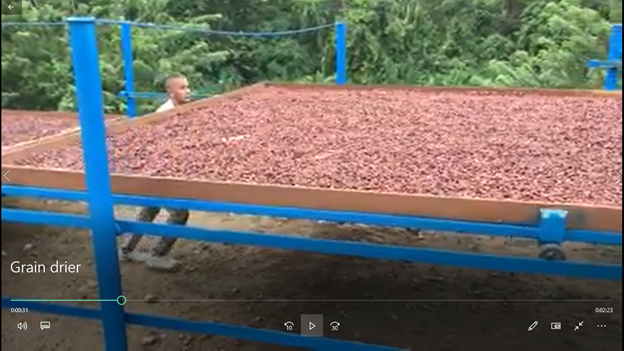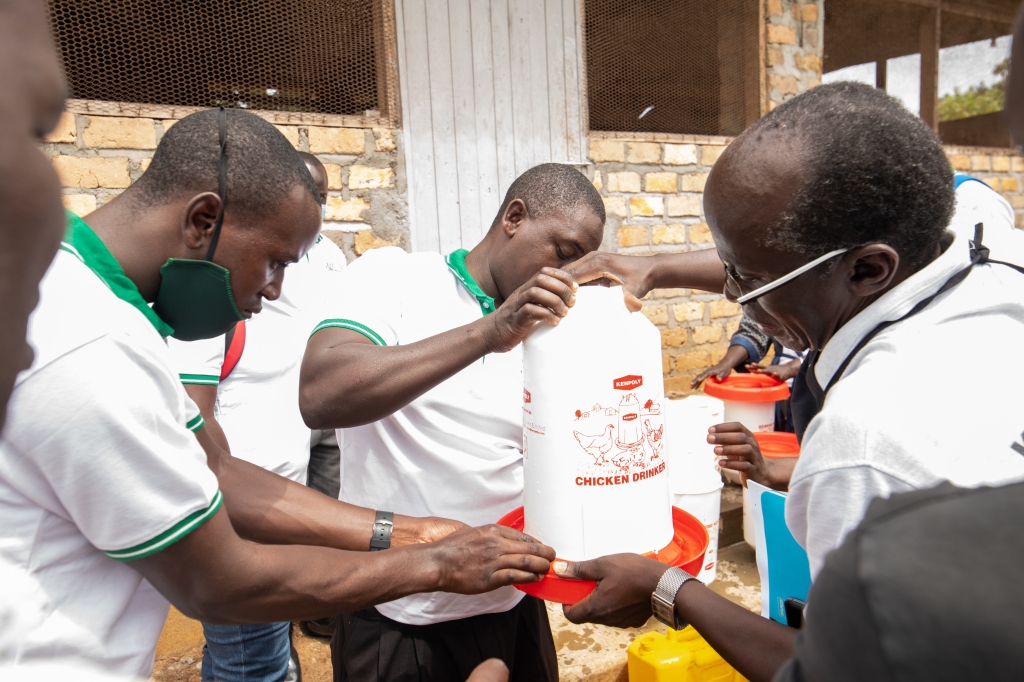
I continue to advocate for all Ugandan children to be given some formal training in Scientific Agriculture production because most of our citizens in Uganda derive their livelihood on Agriculture. The picture attached shows an innovative system developed for drying grains and must have been designed by an engineer and can only be perfected by someone who knows the challenges of farmers. At the worst, the engineer must have passion for agriculture probably developed from school or from interaction with farmers but may not just be doing a job. How many farmers could possibly purchase such an innovative product if the designer’s mind is for profit making and if the Ugandan government does not purchase in bulk and supply these to cooperatives. Therefore, we need to grow the passion of our citizens in the agricultural sector so that they can grow their innovations beyond money benefit. Even medical doctors need to carry out preventive medicine instead of curative approaches. Doctors can only speak about homestead gardens for a better health well enough if they participated in setting up one either at home or in school during their formative years. It is schools that are best suited for the transfer of scientific knowledge to our communities.

Lawyers should be discussing agriculture law concerned with protecting the rights of farmers. The challenges of price fluctuations are not for economists alone but also the teams that fight for the rights of the poor farmers. Lawyers cannot fight for the rights of maize farmers like the recent aflatoxins case, when Kenya put a ban on Ugandan produced maize, when they do not understand the process of growing maize and the value chain. The lawmakers in the Ugandan parliament should all be taken through a course on agriculture management (for lack of a better term) so that they can become creative and innovative as they organise our communities for development. A leader who knows little about the needs of our communities will do very little to support the required development of our people. This is the real need for agriculture education classes within our schools so that we engage the young in scientific practical agriculture skilling at a very early stage.
The Uganda primary school science curriculum is rich of agriculture topics but taught from the blackboard, yet schools have big chunks of land. I hope the Parish model being introduced in Uganda as a development vehicle will add a concept on education so that our schools participate actively in the development of our communities. In 2019, I wrote a paper with a focus on how the Primary School Science Curriculum can be used in Community development to Dr. Suruma Ezra, the Head of the Prime minister’s delivery unit (PMDU), then as the expert educationist in the unit, at the time when he was pioneering the work on the parish model. Of course, an idea from a nobody can only be put on paper but may never reach the high table.
The parish model is great but will benefit us more if the farmers within this framework are also prepared to promote the learning of agricultural science in our primary schools within the parish. My wish is that even teachers of mathematics are retooled to teach addition, multiplication, and other concepts from a poultry unit in the community as the children feed the chicken and collect eggs. Then the English language teacher could follow this with writing a composition as the social studies classes talk about traditional ways of life using the agricultural context. Many children who start school in Uganda at Primary one (1.8 million in 2015) do not proceed to the next level of secondary school (survival rate of 30.1% , Education sector strategic plan 2007-2015). Our focus should be to provide skills to the children within the most common practices of agriculture before they drop out of school and cannot find meaningful employment within the agriculture sector which is the most common employment area. On the other hand this may also increase their interest in school and as they stay longer they receive more skilling to make them ready for the world of work and hence preparing a better entrepreneurial workforce.
Iam happy the lower secondary curriculum has changed with a focus on Project Based Learning (PBL) and use of ICT. The change further promises certification of skills learnt before the end of the learning cycle. If this curriculum is well implemented, then Uganda will be on the correct path of economic recovery. The next step is to retool the teachers in design and implementation of projects. Teachers should be supported to run group projects using the school grounds and policies adapted to support this. The Presidential initiative on wealth and job creation code named “emyoga program” should target our educationists if we want to build sustainable learning that will impact on the young in schools. I know of some teachers who have become great poultry farmers and their farms could as well be the classrooms for their students. I salute my A-level mathematics classes (2014-2017) who set up the banana mathematical gardens at Gayaza High School farm and thanks to Brian Kibirige (farm manager) and Dr. Semambo Dan (Veterinarian and parent). Teachers need support from practicing experts if we are going to succeed in this approach teaching through school projects. I am sure these banana units still feed Gayaza High school long after the designers have left. The learning in these units was fantastic for my students and I but even more importantly for the other students and teachers who visited from other schools.
I hope Ministry of Agriculture (MAAIF) will find this space important to promote agricultural projects in schools with partners like FAO, Embassy of Netherlands, Belgium, USA, Ireland, and others. We should see a more vibrant effort to grow the relationship between Ministry of Education and that of Agriculture with other MDAs, setting up a taskforce coordinated by the Office of the Prime Minister together with the National planning Authority (NPA). I am confident that the Uganda National Development Plan (NDPIII,2021-25) strategic plan will have a focus on this but our effort should be to interest the President of Uganda in this.

At VVOB education for development, we continue to build the capacity of the agriculture lecturers in the National Teacher colleges (NTCs), so that they train the preset teachers of agriculture practically to enhance practical agriculture learning in schools soon. The challenge now is that agriculture is an elective subject within the new lower secondary curriculum and fewer schools have opted to have it on their timetable, hence very few students are offering the subject. The Ugandan government needs to be very deliberate in accelerating the development of our country by creatively structuring our education system to provide the vital skills of economic growth through a more compulsory approach to education.
My wish is that ALL teachers in Uganda should be skilled in agriculture and supported to teach from the known (agriculture context) to the unknown. Let us apply the science and art we teach to our agricultural context so that schools can transfer good agriculture practices to their communities.
For further discussions contact ronaldddungu@vvob.org

